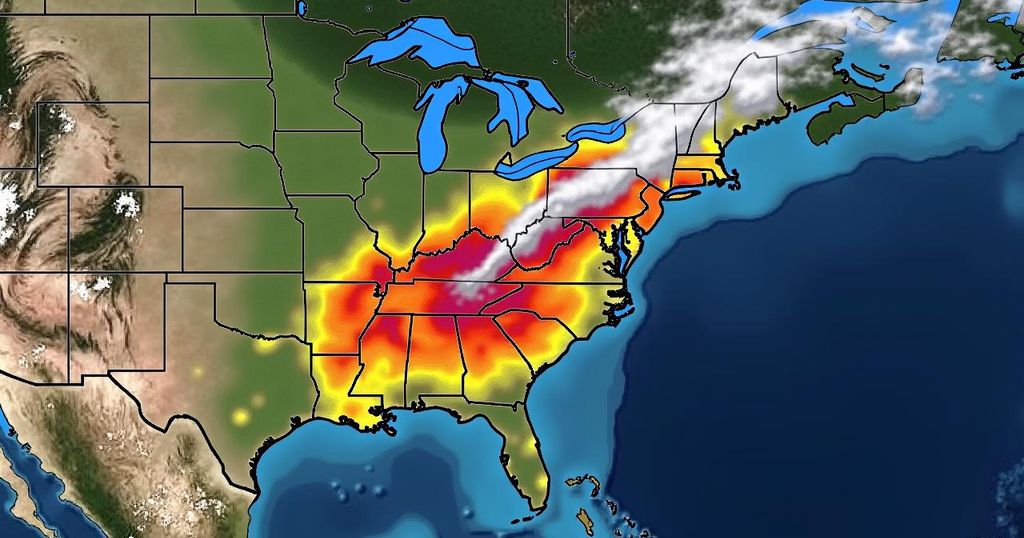Climate Change’s Profound Impact on Hurricane Intensity: Lessons from Helene and Milton
Human-caused climate change has substantially increased the rainfall and wind speeds of Hurricane Helene, with a 10% and 11% increase, respectively. As Hurricane Milton approaches, scientists predict similar enhancements due to climate change, warning of the serious implications for hurricane frequency and associated flood risks. The need for improved emergency preparedness and resilience planning is emphasized.
Recent studies have confirmed that human-induced climate change significantly intensified Hurricane Helene, leading to a 10% increase in rainfall and an 11% increase in wind speed. The analysis conducted by scientists from World Weather Attribution revealed that the warming climate caused wind speeds to rise by approximately 13 miles per hour and heightened the likelihood of the high sea temperatures that fueled Helene’s formation. Specifically, ocean temperatures in the Gulf of Mexico exceeded the average by 3.6 degrees Fahrenheit. Ben Clarke, a climate researcher at Imperial College London and co-author of the study, explained, “Hurricane Helene and the storms that were happening in the region anyway have all been amplified by the fact that the air is warmer and can hold more moisture, which meant that the rainfall totals — which, even without climate change, would have been incredibly high given the circumstances — were even higher.” As Hurricane Milton approaches the Florida coast, scientists anticipate similar enhancements due to climate change. They caution that ongoing fossil fuel use will lead to an increase in hurricanes like Helene, resulting in devastating floods that extend far beyond coastlines, ultimately endangering lives and infrastructure. When Helene made landfall, it brought a record storm surge of 15 feet and sustained winds of 140 miles per hour, devastating several states including Georgia, the Carolinas, Tennessee, and Virginia. The storm caused extensive damage, leaving millions without power and contributing to the deaths of over 230 individuals. Notably, many fatalities were due to catastrophic inland flooding rather than wind impacts. Meteorologists estimate that Helene released more than 40 trillion gallons of rain, an unprecedented volume exacerbated by climate change. Clarke stated, “When you start talking about the volumes involved, when you add even just a few percent on top of that, it makes it even much more destructive.” Historically, storms of Helene’s intensity were projected to occur only once every 130 years; however, current data suggests they are now about 2.5 times as frequent in the affected region. The implications of this research are dire, urging immediate action to mitigate climate change risks. As Kim Cobb from the Institute at Brown for Environment and Society articulated, it is crucial to enhance emergency preparedness and resilience plans. She emphasized that forthcoming warming will likely escalate hurricane statistics even further. Clarke remarked on the broader implications of the storm patterns, “As we go into the future and our results show this as well, we still have control over what trajectory this goes in as to what risks we face in the future, what costs we pay in the future. That just hinges on how we change our energy systems and how many more fossil fuels we burn.” Overall, the findings underline the urgent need for addressing climate change to prevent further escalation of such disasters in the future.
The article discusses the impact of climate change on hurricane intensification, specifically focusing on Hurricanes Helene and Milton. It highlights how human activities and resultant global warming considerably influence storm intensity, leading to increased rainfall and wind speeds, associated risks, and fatalities. The research conducted by World Weather Attribution underscores the growing frequency and severity of such storms due to climate change, prompting a call for enhanced resilience and preparedness in affected areas.
In conclusion, the analysis of Hurricane Helene emphasizes the considerable effects of climate change on storm intensity and the inevitable risks posed by future hurricanes, including Milton. As scientists warn of the increasing frequency of such events, the necessity for immediate action to mitigate climate change impacts becomes critical. Enhanced emergency preparedness and innovation in energy systems will be pivotal in addressing these challenges moving forward.
Original Source: www.siouxlandproud.com




Post Comment